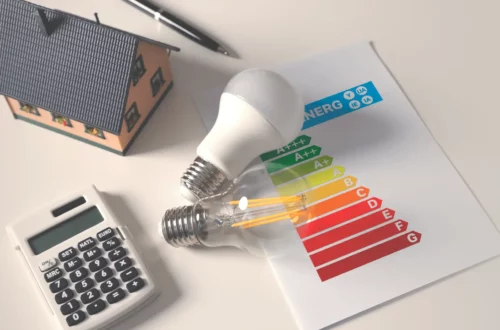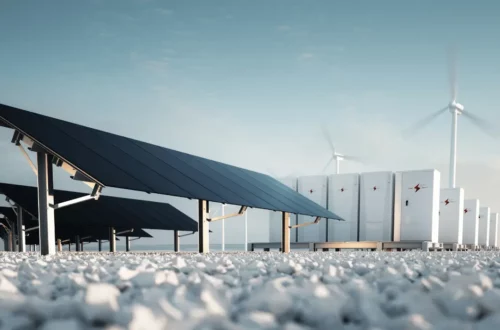Increased Energy Efficiency Ultimately Leads to Lower Costs

Energy efficiency is a crucial aspect of our lives that can have significant financial benefits. By implementing energy-saving measures, individuals and businesses can not only reduce their energy bills but also contribute to a greener and more sustainable world. Energy efficiency revolves around using less energy to accomplish the same amount of work or even more. This means finding ways to minimize energy waste and maximize the output we achieve.
The cost of energy has a direct impact on households and businesses. Rising energy prices can strain budgets and hinder economic growth. However, embracing energy efficiency can help alleviate this burden. By implementing energy-saving practices, such as using energy-efficient appliances, improving insulation, and adopting renewable energy sources, individuals and organizations can achieve substantial cost savings over time.
we will explore various aspects of energy efficiency and provide practical tips to increase energy efficiency in different areas of life. From reducing energy waste in households to implementing energy-efficient technologies in businesses, we will delve into the multiple benefits of embracing energy efficiency. So, let’s dive in and discover how increased energy efficiency can ultimately lead to lower costs while contributing to a more sustainable future.
Energy Costs
Energy costs have a significant impact on both households and businesses, often comprising a significant portion of monthly expenses. With the rising prices of electricity, gas, and fuel, finding ways to reduce energy costs has become imperative. This is where energy efficiency plays a crucial role.
By implementing energy-efficient measures, individuals and businesses can lower their energy consumption, leading to substantial cost savings in the long run. Energy efficiency aims to optimize energy usage, accomplishing the same tasks with lesser energy consumption. From upgrading to energy-efficient appliances and using smart thermostats to improving insulation and adopting renewable energy sources, there are various strategies to achieve energy efficiency.
By reducing energy waste and embracing energy-efficient practices, households and businesses can significantly lower their energy bills, freeing up funds for other expenses. Moreover, energy efficiency also contributes to preserving our environment and reducing the overall carbon footprint. As such, the pursuit of energy efficiency is not only beneficial in terms of cost savings but also in building a sustainable future.
To summarize, by prioritizing energy efficiency, individuals and businesses alike can combat rising energy costs, save money, and contribute to a greener world. It’s a win-win situation that simultaneously benefits both our wallets and the planet we call home.
Remember, small changes and conscious decisions can go a long way in making a significant impact on our energy consumption and costs.
Also read: The Complete Guide to Powering Your Home with Renewable Energy
What is Energy Efficiency?
Energy efficiency refers to the ability to use energy in a more effective and efficient manner, achieving the same level of output with less energy consumption. The aim of energy efficiency is to optimize the use of energy resources, thereby reducing wastage and minimizing costs. By adopting energy-efficient practices and technologies, individuals and businesses can accomplish their desired tasks while consuming less energy. This can be achieved through various means such as upgrading to energy-efficient appliances, improving insulation, using renewable energy sources, and implementing smart technologies. Ultimately, energy efficiency enables us to make the most out of our energy resources, leading to both cost savings and a more sustainable future.
Also read: Renewable Energy vs Fossil Fuels: Which One is Better?
Areas of Waste and How to Increase Energy Efficiency
In our daily lives, there are numerous areas where we unknowingly waste energy, leading to higher costs and unnecessary environmental impact. By identifying and addressing these areas, we can increase energy efficiency and lower our expenses. Here are some practical tips for increasing energy efficiency in different aspects of life:
Home Energy Efficiency
– Insulation: Ensure your home is properly insulated to prevent heat loss during colder months and reduce the need for excessive heating.
– Lighting: Switch to energy-efficient LED bulbs, which consume less electricity and last longer than traditional incandescent bulbs.
– Appliances: Replace outdated appliances, such as refrigerators and washing machines, with energy-efficient models that are certified by Energy Star.
– Heating and Cooling: Use programmable thermostats to regulate temperature settings, avoiding unnecessary energy consumption when you’re away or asleep.
Transportation Efficiency
– Carpooling: Share rides with colleagues or neighbors to reduce fuel consumption and optimize vehicle occupancy.
– Public Transit: Utilize public transportation whenever possible to decrease individual carbon emissions and alleviate traffic congestion.
– Cycling or Walking: Choose active modes of transportation for shorter distances, which not only saves energy but also promotes personal health.
Workplace Efficiency
– Lighting and Equipment: Switch off lights and unplug electronic devices when not in use. Utilize natural lighting whenever available.
– Energy Audits: Conduct regular energy audits to identify areas of waste and develop strategies for improvement.
– Remote Work: Encourage telecommuting options to reduce energy consumption associated with commuting.
Lifestyle Efficiency
– Water Conservation: Install water-saving fixtures and be mindful of water usage to reduce the energy required for water treatment and distribution.
– Reduce, Reuse, Recycle: Minimize waste generation and opt for reusable products whenever possible.
– Sustainable Cooking: Match pan sizes to burner sizes and cover pots to retain heat, reducing cooking time and energy consumption.
By implementing these energy-saving measures, not only can we lower our costs but also contribute to a greener and more sustainable future. Remember, small changes in our daily habits can make a significant difference in overall energy efficiency. As the saying goes, “Every little bit helps.” Let’s strive towards a more energy-efficient lifestyle and inspire others to join us in this journey.
Also read: How Renewable Energy is Transforming the Environment: 5 Major Benefits
Environmental Impact and Benefits
Energy efficiency is not only crucial for reducing costs but also plays a significant role in creating a more sustainable future. By implementing energy-efficient measures, individuals and businesses can make a positive impact on the environment. Here are some of the key environmental benefits of energy efficiency:
1. Reduced Carbon Emissions: One of the biggest advantages of energy efficiency is the reduction in greenhouse gas emissions. By optimizing energy use and reducing waste, energy-efficient practices contribute to the fight against climate change. This is particularly important considering the hefty price tag associated with the environmental costs of relying on fossil fuel power plants.
2. Conservation of Natural Resources: Energy efficiency helps conserve valuable natural resources. When we use less energy to accomplish the same tasks, we decrease the demand for energy production, including the consumption of limited fossil fuel resources. Moreover, energy-efficient technologies often rely on renewable energy sources, such as solar panels or wind turbines, mitigating the need for non-renewable resources.
3. Improved Air Quality: Energy efficiency measures also lead to improved air quality. By reducing the overall energy consumption and shifting towards cleaner energy sources, we can minimize harmful emissions, including carbon dioxide and various air pollutants. This, in turn, benefits human health and the environment, especially in areas with high pollution levels.
4. Mitigation of Climate Change: Energy efficiency directly contributes to mitigating climate change. As we reduce energy waste, the demand for energy production decreases, including the need for fossil fuel combustion. By decreasing our reliance on fossil fuels, which release significant amounts of greenhouse gases, we can work towards stabilizing global temperature rise and reducing the impacts associated with global warming.
Also read: Why You Should Consider Solar Energy for Your Home | Advantages of Solar Energy
Energy Efficiency in Businesses
Implementing energy-efficient measures and technologies can bring significant benefits to businesses. Not only do they help lower energy costs, but they also contribute to a greener environment. Here are some key advantages of embracing energy efficiency in a business setting:
1. Cost Savings
By optimizing energy consumption, businesses can reduce their energy bills. Implementing energy-efficient practices, such as using LED lighting, upgrading to energy-efficient appliances, and improving insulation, can lead to substantial savings in the long run. Cutting down on energy waste means more money in the company’s pocket.
2. Enhanced Reputation
Operating in an environmentally responsible manner is increasingly important to consumers. By prioritizing energy efficiency, businesses can improve their reputation and attract environmentally conscious customers. Being seen as a sustainable and socially responsible company can also lead to increased brand loyalty and customer satisfaction.
3. Regulatory Compliance
As governments around the world tighten environmental regulations, businesses that embrace energy efficiency are more likely to comply with these requirements. By implementing energy-efficient measures, companies can avoid potential penalties or legal issues, ensuring they remain in good standing with regulatory bodies.
4. Competitive Advantage
In today’s competitive market, businesses that prioritize energy efficiency gain a distinct advantage. Energy-efficient operations can help reduce production costs, allowing companies to offer competitive pricing to customers. Additionally, businesses that actively promote their energy-efficient practices can attract environmentally conscious clients who prefer to support sustainable companies.
5. Innovation and Technological Advancements
Investing in energy-efficient technologies often goes hand in hand with innovation and technological advancements. By embracing these solutions, businesses can stay at the forefront of industry trends and position themselves as leaders in their field. This not only helps future-proof the business but also opens doors to new business opportunities and partnerships.
Also read: Upgrade Your Home’s Energy Efficiency with These 12 Easy Steps
Conclusion
Embracing energy efficiency is not only beneficial for reducing costs but also plays a crucial role in creating a sustainable future. By implementing energy-saving measures and adopting efficient technologies, individuals and businesses can significantly lower their energy bills. This not only puts more money back into their pockets but also helps in conserving valuable resources and reducing harmful emissions. Investing in energy-efficient appliances, improving insulation, and practicing energy-saving habits are just a few examples of how we can make a positive impact. Embracing energy efficiency is a win-win situation, benefiting both our wallets and the environment. So, let’s take the necessary steps towards a greener and more cost-effective future.





